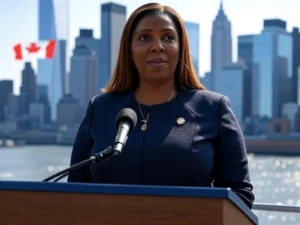
New York’s Sweepstakes Casino Shutdown and Its Impact on Canada
In a bold move, New York’s Attorney General Letitia James has secured the suspension of 26 sweepstakes casino brands operating across the state. The announcement, made during a recent press conference, marks a significant step in the state’s efforts to curb what it considers illegal gambling. The targeted platforms, including popular names like Chumba, Luckyland, High 5 Casino, and Zula Casino, had previously received cease-and-desist notices from the state. According to James, none of these brands chose to fight the orders, effectively halting their operations in New York.
The complete list of suspended sweepstakes casinos includes: Chanced, Chumba, DingDingDing, Fliff, Fortune Coins, Fortune Wheelz, Funrize, FunzCity, Global Poker, Golden Hearts Games, High 5 Casino, Jackpota, Luckyland, McLuck, Mega Bonanza, NoLimitCoins, Play Fame, RealPrize, Sidepot, SpinBlitz, Sportzino, SweepSlots, Sweeptastic, TaoFortune, Yay Casino, and Zula Casino.
Legal Loopholes Under Fire
Although a bill to formally ban sweepstakes casinos is still under review in the New York State Senate, the Attorney General’s Office and the New York State Gaming Commission have already classified these platforms as illegal gambling operations. Sweepstakes casinos often operate by offering “free” entries or virtual currencies, presenting themselves as promotional contests rather than traditional legal gambling.

However, regulators argue that these platforms function similarly to online casinos, exploiting legal loopholes to bypass oversight.
James emphasized that the state’s aggressive enforcement reflects a commitment to protecting consumers from unregulated gambling. With this crackdown, New York has effectively closed the door on sweepstakes casinos, at least for the foreseeable future, signaling a broader push to strengthen gambling regulations.
The crackdown on sweepstakes casinos in New York highlights a broader trend in the U.S., where legal online gambling remains a patchwork of state-specific regulations. As of June 2025, as the platform notes, only seven states—New Jersey, Delaware, West Virginia, Pennsylvania, Michigan, Connecticut, and Rhode Island—have fully legalized and regulated online casino gaming, offering a controlled environment with consumer protections and tax revenue for state coffers. This contrasts sharply with the 46 states where sweepstakes casinos have operated in a legal gray area, exploiting loopholes to offer casino-style games without the oversight required of traditional online gambling. New York’s aggressive stance could pressure other states to either tighten restrictions on these platforms or push for broader legalization of regulated online gambling, potentially reshaping the national landscape in the coming years.
What This Means for Canada
The developments in New York could resonate in Canada, where sweepstakes casinos have also gained traction. In Ontario, which operates a regulated online gambling market under the Alcohol and Gaming Commission of Ontario (AGCO), these platforms often exist in a legal gray zone. Ontario’s iGaming framework, established in 2022, requires operators to secure licenses, but sweepstakes casinos frequently skirt these rules by framing their offerings as contests rather than gambling.
New York’s decisive action may inspire Canadian regulators to take a closer look at these platforms. In provinces like British Columbia and Quebec, where gambling oversight is stringent, authorities might consider adopting similar measures to address unregulated operators.
Consumer concerns about sweepstakes casinos—such as unclear payout processes and aggressive marketing tactics—could further pressure Canadian regulators to act, potentially leading to tighter controls on these platforms nationwide.
A Turning Point for Online Gambling
New York’s shutdown of 26 sweepstakes casinos underscores a growing intolerance for unregulated gambling operations. For players, this serves as a reminder of the risks associated with unlicensed platforms, which often lack the safeguards of regulated environments.
In Canada, where the online gaming market is evolving rapidly, New York’s example could prompt a reevaluation of how sweepstakes casinos are handled.
As the regulatory landscape shifts, both American and Canadian players may need to rely on licensed operators for a safer, more transparent gaming experience. For now, New York’s crackdown sets a powerful precedent, one that could reshape the future of online gambling on both sides of the border.




